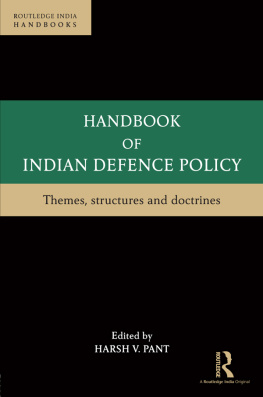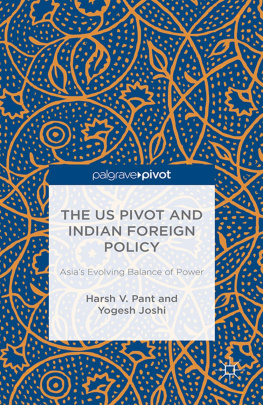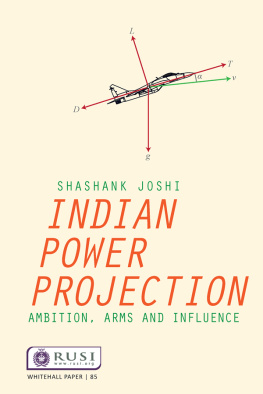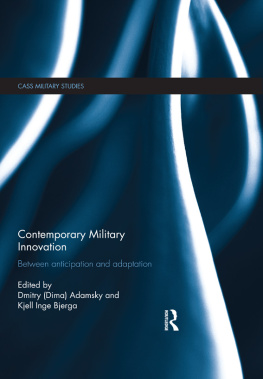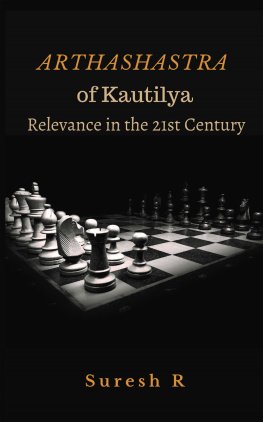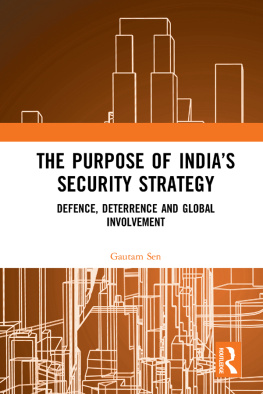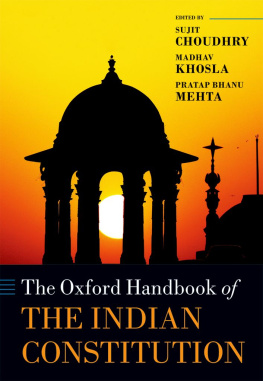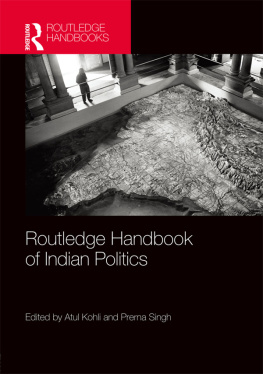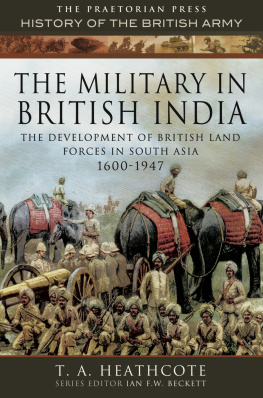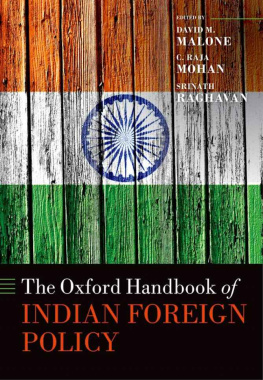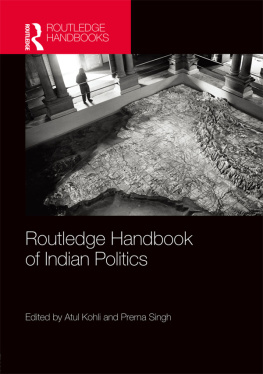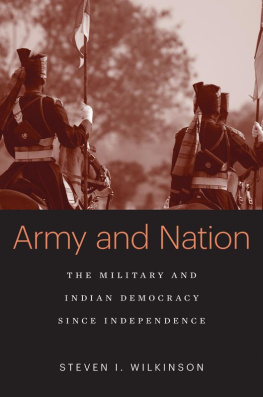Handbook of Indian Defence Policy
India has the worlds fourth largest military and one of its biggest defence budgets. It asserts its political and military profile in South Asia and the Indian Ocean region. The nation has been in the midst of an ambitious plan to modernise its largely Soviet-era arms since the late 1990s and has spent billions of dollars on the latest high-tech military technology.
This handbook:
- canvasses over 60 years of Indian defence policy and the major debates that have shaped it;
- discusses several key themes, such as the origins of the modern armed forces in India, military doctrine and policy, internal and external challenges and nuclearisation and its consequences and;
- includes contributions by well-known scholars, experts in the field and policymakers.
Presented in an accessible format, this lucidly written handbook will be an indispensable resource for scholars and researchers of security and defence studies, international relations and political science, as well as for government think tanks and policymakers.
Harsh V. Pant is Professor of International Relations in the Defence Studies Department and the India Institute at Kings College, London. He is Non-Resident Fellow with the Wadhwani Chair in USIndia Policy Studies at the Center for Strategic and International Studies, Washington, DC. His current research is focused on Asian security issues. His recent books include Indias Afghan Muddle (2014), The Rise of the Indian Navy: Internal Vulnerabilities, External Challenges (2012), and The Rise of China: Implications for India (2012). Pant writes regularly for various media outlets, including The Japan Times, The Wall Street Journal, The National (UAE), and The Telegraph.
Handbook of Indian Defence Policy
Themes, structures and doctrines
Edited by Harsh V. Pant

First published 2016
by Routledge
2 Park Square, Milton Park, Abingdon, Oxon OX14 4RN
and by Routledge
711 Third Avenue, New York, NY 10017
Routledge is an imprint of the Taylor & Francis Group, an informa business
2016 Harsh V. Pant
The right of Harsh V. Pant to be identified as the author of the editorial material, and of the authors for their individual chapters, has been asserted in accordance with sections 77 and 78 of the Copyright, Designs and Patents Act 1988.
All rights reserved. No part of this book may be reprinted or reproduced or utilised in any form or by any electronic, mechanical, or other means, now known or hereafter invented, including photocopying and recording, or in any information storage or retrieval system, without permission in writing from the publishers.
Trademark notice: Product or corporate names may be trademarks or registered trademarks, and are used only for identification and explanation without intent to infringe.
British Library Cataloguing-in-Publication Data
A catalogue record for this book is available from the British Library
Library of Congress Cataloging-in-Publication Data
A catalog record has been requested for this book
ISBN: 978-1-138-93960-8 (hbk)
ISBN: 978-1-315-67474-2 (ebk)
Typeset in Bembo
by Apex CoVantage, LLC
Contents
Harsh V. Pant
Section 1
Soldier, State and Society in India
Daniel Marston
Ayesha Ray
Kaushik Roy
Section 2
Military and Foreign Policy
Yogesh Joshi and Harsh V. Pant
Sushant K. Singh
Nitin A. Gokhale
Section 3
The Services
Sunil Dasgupta
Arun Prakash
Vinod Patney
Vinod Anand
Section 4
Doctrines
Ali Ahmed
Manjeet S. Pardesi
Arjun Subramaniam
Section 5
Defence Versus Development
Laxman Kumar Behera
Amit Cowshish
Section 6
Internal Security
Stephen Tankel
Ajai Sahni
Bibhu Prasad Routray
Section 7
Institutional Infrastructure
Frank ODonnell and Harsh V. Pant
Vikram Sood
R. N. Ravi
Narender Kumar
Section 8
Nuclear Weapons and Space
Verghese Koithara
Rajeswari Pillai Rajagopalan
Figures
Tables
Ali Ahmed, a former Indian Army colonel, has been a strategic analyst with a think tank and has taught peace studies at a university. Views in the chapter are personal.
Brigadier Vinod Anand served in the Indian Army for 37 years. Presently, he is writing a book on missile defence titled, Missile Warfare Capability: Indias National and Military Strategies: A Contemporary Appraisal.
Laxman Kumar Behera is Research Fellow at the Institute for Defence Studies and Analyses (IDSA), New Delhi. He was a Consultant to the Task Force on Self-Reliance and Defence Modernisation constituted by the National Security Council Secretariat (NSCS), Government of India.
Amit Cowshish is a Distinguished Fellow at the Institute for Defence Studies and Analyses (IDSA) and a former Financial Advisor (Acquisition) & Additional Secretary, Ministry of Defence and Member, Defence Procurement Board.
Sunil Dasgupta teaches political science at the University of Maryland Baltimore County, USA. He is co-author, with Stephen P. Cohen, of Arming Without Aiming: Indias Military Modernization (Brookings Institution Press, 2010).
Nitin Gokhale is currently Security & Strategic Affairs editor with Indias leading broadcaster, NDTV.
Yogesh Joshi is a doctoral candidate at the Center for International Politics, Organisation and Disarmament, School of International Studies, Jawaharlal Nehru University, India.
Verghese Koithara is a retired vice-admiral. He has authored three books on Indias security.
Narender Kumar is a serving officer of the Indian Army and former senior fellow, Centre for Land Warfare Studies, New Delhi. He is currently holding the COAS Chair of Excellence with CLAWS.
Daniel Marston holds a professorship in Military Studies and is also the principal of the Military and Defence Studies Program at the Australian Command and Staff College in Canberra.
Frank ODonnell is a Lecturer in Strategic Studies at University of Plymouth.
Verghese Koithara is a retired Vice Admiral. He has authored three books on Indias security, including Managing Indias Nuclear Forces (Brookings Institution Press and Routledge, 2012).
Manjeet S. Pardesi is lecturer in International Relations and an Asia Research Fellow at the Centre for Strategic Studies at Victoria University of Wellington in New Zealand.
Air Marshal Vinod Patney SYSM, PVSM, AVSM, VrC (Retd) is a distinguished fighter pilot and a decorated veteran of the 1965 and 1971 wars. Presently, he is the director general of Centre for Air Power Studies, New Delhi.
Admiral Arun Prakash was the 20th chief of the Indian Navy and served concurrently as the chairman of the Chiefs of Staff Committee. Post-retirement in 2006, he writes and speaks on maritime and strategic issues.
Rajeswari Pillai Rajagopalan is senior fellow at the Observer Research Foundation in New Delhi. She served at the National Security Council Secretariat, Government of India, from 2003 to 2007.
R. N. Ravi is Chairman, Joint Intelligence Committee, in the office of the Prime Minister and the Government of India Interlocutor for bringing peace with the separatist Naga militias in Indias North-East.

